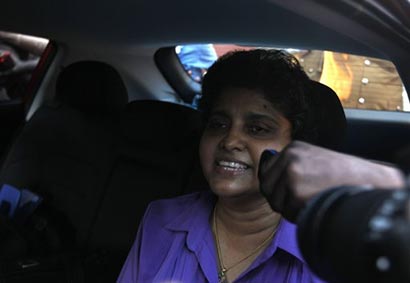World judges condemn Sri Lanka on chief justice sacking

(Reuters) – Leading judges and jurists from around the world, many from developing countries, on Wednesday condemned the Sri Lankan government’s sacking of the country’s chief justice, arguing it violated international law.
The 44-strong group, all members of the Geneva Centre for the Independence of Judges and Lawyers (CIJL), called for the immediate reinstatement of Shirani Bandaranayake.
At the same time, the head of the Geneva-based International Commission of Jurists (ICJ), which works to promote the rule of law, said the move had set Sri Lanka on the path toward authoritarian rule.
The judges’ strictures were issued in a letter to Sri Lankan President Mahinda Rajapaksa and his brother, the speaker of parliament Chamal Rajapaksa from the ICJ and the CIJL.
It was the latest of a series of criticisms from independent organisations and United Nations officials in Geneva since President Rajapaksa last week dismissed Bandaranayake as chief justice and appointed one of his allies in her place.
“We are gravely concerned that the recent action to remove the chief justice have been taken in contravention of the (Sri Lankan) constitution, and international human rights law and standards, including the right to a fair hearing, and the rule of law,” the letter said.
Former attorney-general Mohan Peiris, whom Rajapaksa named as new chief justice, was widely known “for consistently blocking efforts to hold state officials accountable for gross human rights violations,” it said.
The parliamentary impeachment of Bandaranayake, on which the president based his decision to remove her, and her dismissal “disregarded international standards of judicial independence and minimum guarantees of due process and fair trial,” it added.
ICJ Secretary General Wilder Tayler, a Uruguayan lawyer, said in a statement the Rajapaksa administration “has brought Sri Lanka within steps of authoritarian rule, dismantling the system of checks and balances and eviscerating judicial independence.”
Reuters
Latest Headlines in Sri Lanka
- Court orders arrest of Shamindra Rajapaksa in SriLankan Airlines Airbus bribery case February 2, 2026
- Chaminda Kularatne files corruption complaint against speaker February 2, 2026
- Chinthaka Hewapathirana elected new Chairman of Weligama Pradeshiya Sabha February 2, 2026
- Sri Lanka to protect and develop 3.1 Billion-ton quartz reserve in Monaragala February 2, 2026
- Police Inspector, Constable arrested over missing gun at Matugama Police Station February 2, 2026



Leading judges and jurists from around the world, many from developing countries, on Wednesday condemned the Sri Lankan government’s sacking of the country’s chief justice, arguing it violated international law.
The 44-strong group, all members of the Geneva Centre for the Independence of Judges and Lawyers (CIJL), called for the immediate reinstatement of Shirani Bandaranayake
The Sri Lankan Government will only have big laugh at this request. So what action can the World Judges take to implement their request, if the Sri Lankan government just ignores their request???
MAHINDAGEY , SHIRANIGEY WEDAWALATA ASARANA JANATHAWA THAMA PAW GEWANNA WENNE .. A DENNATA MOKUTH WENNE NA.
These bodies are tools of the imperial West,neo-colonialists, who try to rule the smaller nations to abide by their will, to exploit smaller nations of the Freeworld.
They should never be allowed to win the day. The imperial West are the autocrats, the despots. Look at USA whose policy is to destroy any govt that does not bend to the imperial West authority and wishes. They use CIA, MI6 and other spying organisations with their evil tentacles spread around the globe to carry out assassinations using local hitmen. Our President is in danger from these hitmen. I hope he has taken precaustions to strengthen his security as US President’s security is beefed up.
The real threat to world peace is US govt and its allies. They are war criminals, human rights abusers and have committed crimes against humanity and continue to do so will nilly. UN is totally powerless to bring them to book. On the otherhand the UN at the behest of USA and the imperialist West is only too ready to vociferously denounce small nations like SL on trumped upcharges of human rights violations.
The former CJ is corrupt as hell with her husband. She was rightly removed from office in accordance with our Constitution for the good of the judicairy in SL. Her husband was sacked from chairmanship of NSB. Why should the imperial West countries find fault with SL for it? We do not interfere in their internal affairs despite utter human rights abuse in their own countries. How dare they try to dictate terms to us? Why don’t they clean their own house first?
There’s been no comment from judges in Russia and Chinal who are our true friends. In fact, their silence indicates support for our nation’s noble actions in eliminating judges for misbehaviour in office.
Following up on the impeachment incident, we have extended the suspect-in-custody period to 48 hours. Great strides indeed.
We should reintroduce capital punishment including beheading for serious offences.
We are now the showcase to the world; we will shine.
Prana’s comments throw light on the free world’s perception of the recent removal of the Chief Justice.
Shiranee Bandaranayake should come out in the open with the truth. Like the champion cyclist, Lance Armstrong, as Jesus Christ said, ‘The truth will set you free’.
Living in a pretend world of “I am the lawfully appointed Chief Justice” will neither get Shiranee or society as a whole, anywhere.